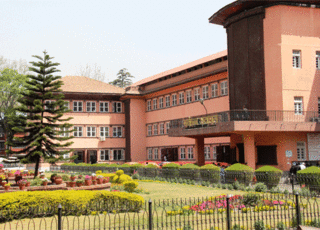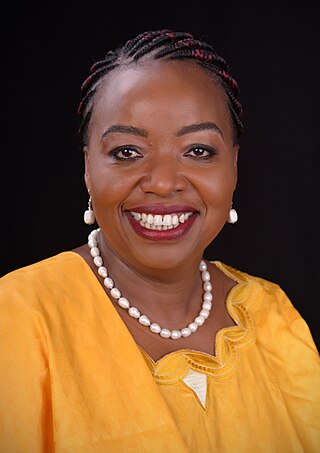 |
|---|
The Public Service Commission (PSC) of Kenya is an independent government commission established under Article 233(1) of the Constitution of Kenya to manage human resources in the Kenya Civil Service and the Local Authorities. [1]
 |
|---|
The Public Service Commission (PSC) of Kenya is an independent government commission established under Article 233(1) of the Constitution of Kenya to manage human resources in the Kenya Civil Service and the Local Authorities. [1]
Article 234 of the Constitution outlines the functions and powers of the Public Service Commission. [2] According to the article the Commission is expected to:
The current membership of the Commission (2019-2025) is as follows: [4]

The president of India is the head of state of the Republic of India. The president is the nominal head of the executive, the first citizen of the country, as well as the supreme commander of the Indian Armed Forces. Droupadi Murmu is the 15th and current president, having taken office from 25 July 2022.
Chapter 10: State Services.Chapter 10 of the 1997 Constitution of Fiji is titled State Services. Its fifteen sections establish certain civil service offices, specify their functions and jurisdictions, set out the qualifications and preconditions required of persons holding such offices, and prescribes the manner of their appointment.

The vice president of India is the deputy to the head of state of the Republic of India, i.e. the president of India. The office of vice president is the second-highest constitutional office after the president and ranks second in the order of precedence and first in the line of succession to the presidency. The vice president is also the ex officio chairman of the Rajya Sabha.

The Supreme Court of Nepal is the highest court in Nepal. It has appellate jurisdiction over decisions of the seven High Courts and extraordinary original jurisdiction. The court consists of twenty Justices and one Chief Justice.

The deputy president of the Republic of Kenya is the principal assistant of the President of the Republic of Kenya.
The Ministry of Law and Justice in the Government of India is a cabinet ministry which deals with the management of the legal affairs, legislative activities and administration of justice in India through its three departments namely the Legislative Department and the Department of Legal Affairs and the Department of Justice respectively. The Department of Legal Affairs is concerned with advising the various Ministries of the Central Government while the Legislative Department is concerned with drafting of principal legislation for the Central Government. The ministry is headed by Cabinet Minister of Law and Justice Arjun Ram Meghwal appointed by the President of India on the recommendation of the Prime Minister of India. The first Law and Justice minister of independent India was Dr. B. R. Ambedkar, who served in the Prime Minister Jawaharlal Nehru's cabinet during 1947–51.

The Government of the Republic of Kenya (GoK) is the national government of the republic of Kenya which is composed of 47 Counties, each county with its own semi-autonomous governments. The national government is composed of three arms: The Legislature, the Executive and the Judiciary. Each arm is independent of the other and their individual roles are set by the Constitution of Kenya. The full name of the country is the "Republic of Kenya". Its official Swahili name is 'Jamhuri ya Kenya'. Other terms such as GoK, GK and Serikali are popularly used to refer to the Kenyan government.

The Constitution of Bhutan was enacted 18 July 2008 by the Royal Government of Bhutan. The Constitution was thoroughly planned by several government officers and agencies over a period of almost seven years amid increasing democratic reforms in Bhutan. The current Constitution is based on Buddhist philosophy, international Conventions on Human Rights, comparative analysis of 20 other modern constitutions, public opinion, and existing laws, authorities, and precedents. According to Princess Sonam Wangchuck, the constitutional committee was particularly influenced by the Constitution of South Africa because of its strong protection of human rights.

The Counties of Kenya are geographical units created by the 2010 Constitution of Kenya as the new units of devolved government. They replaced the previous provincial system. The establishment and executive powers of the counties is provided in Chapter Eleven of the Constitution on devolved government, the Constitution's Fourth Schedule and any other legislation passed by the Senate of Kenya concerning counties. The counties are also single-member constituencies which elect members of the Senate, and special woman members to the National Assembly.
The National Commission for Backward Classes is an Indian constitutional body under the jurisdiction of Ministry of Social Justice and Empowerment, Government of India established through Constitution Act, 2018 this amendment act in the constitution to make it a constitutional body under Article 338B of the Indian Constitution. It was constituted pursuant to the provisions of the National Commission for Backward Classes Act, 1993.

The High Court of Kenya is a court of unlimited original jurisdiction in criminal and civil matters established under article 165 of the constitution of Kenya as part of the Kenya Judiciary. It also has supervisory jurisdiction over all other subordinate courts and any other persons, body or authority exercising a judicial or quasi-judicial function. It was known as the Supreme Court of Kenya until 1964 and its name has remain unchanged since then.

The Judicial Service Commission (JSC) of Kenya is an independent Commission established under Article 171 of the Constitution of Kenya. Its mandate as stipulated in Article 172 of the Constitution is to promote and facilitate the independence and accountability of the Judiciary and the efficient, effective and transparent administration of justice. The commission has 11 members with the initial team appointed in December 2010.

The Supreme Court of Kenya is the highest court in Kenya. It is established under Article 163 of the Kenyan Constitution. As the highest court in the nation, its decisions are binding and set precedent on all other courts in the country.

The National Land Commission of Kenya is an independent government commission whose establishment was provided for by the Constitution of Kenya to, amongst other things, manage public land on behalf of the national and county governments, initiate investigations into present or historical land injustices and recommend appropriate redress, and monitor and have oversight responsibilities over land use planning throughout the country. NLC was officially established under The National Land Commission Act of 2012.

The Parliamentary Service Commission of Kenya is one of the Independent Commissions in Kenya established under Article 127 the Constitution of Kenya to ensure smooth functioning of the Houses of Parliament i.e. Senate of Kenya and National Assembly of Kenya.

The Teachers Service Commission (TSC) of Kenya is an Independent government Commission established under the Constitution of Kenya, article 237 to manage human resources within the education sector. It is based in the capital city, Nairobi with offices in the counties

The National Police Service Commission of Kenya is an Independent government Commission established under the Constitution of Kenya to ensure smooth functioning of the National Police Service of Kenya.

The Judiciary of Kenya is the system of courts that interprets and applies the law in Kenya. After the promulgation of the Constitution of Kenya in 2010, the general public, through parliament, sought to reform the judiciary. Parliament passed the Magistrates and Judges Vetting Act of 2011. A major part of reforming the judiciary was the vetting of Magistrates and Judges in an attempt to weed out unsuitable ones. The Judicature Act has also been amended to raise the minimum number of Magistrates and Judges allowing more judicial officers to be hired. More magistrates and judges are needed to clear the backlog of cases that have caused great delay in the conclusion of cases and to staff new courts. New courts are needed to bring the courts closer to the people which is in line with devolution, a major principle written into the Constitution of 2010. New courts like the High Court opened in Garissa in November 2014 is a good example. In the past residents of North Eastern Kenya had to go all the way to Embu to access a High Court.

The National Judicial Appointments Commission (NJAC) was a proposed body which would have been responsible for the recruitment, appointment and transfer of judicial officers, legal officers and legal employees under the government of India and in all state governments of India. The commission was established by amending the Constitution of India through the 99th constitution amendment with the Constitution (Ninety-Ninth Amendment) Act, 2014 or 99th Constitutional Amendment Act-2014 passed by the Lok Sabha on 13 August 2014 and by the Rajya Sabha on 14 August 2014. The NJAC would have replaced the collegium system for the appointment of judges as invoked by the Supreme court via judicial fiat by a new system. Along with the Constitution Amendment Act, the National Judicial Appointments Commission Act, 2014, was also passed by the Parliament of India to regulate the functions of the National Judicial Appointments Commission. The NJAC Bill and the Constitutional Amendment Bill, was ratified by 16 of the state legislatures in India, and subsequently assented by the President of India Pranab Mukherjee on 31 December 2014. The NJAC Act and the Constitutional Amendment Act came into force from 13 April 2015.

Monica Kathina Juma is a Kenyan diplomat who currently serves as National Security Advisor to President William Ruto. She previously served as the Cabinet Secretary for Defence in the cabinet of President Uhuru Kenyatta.